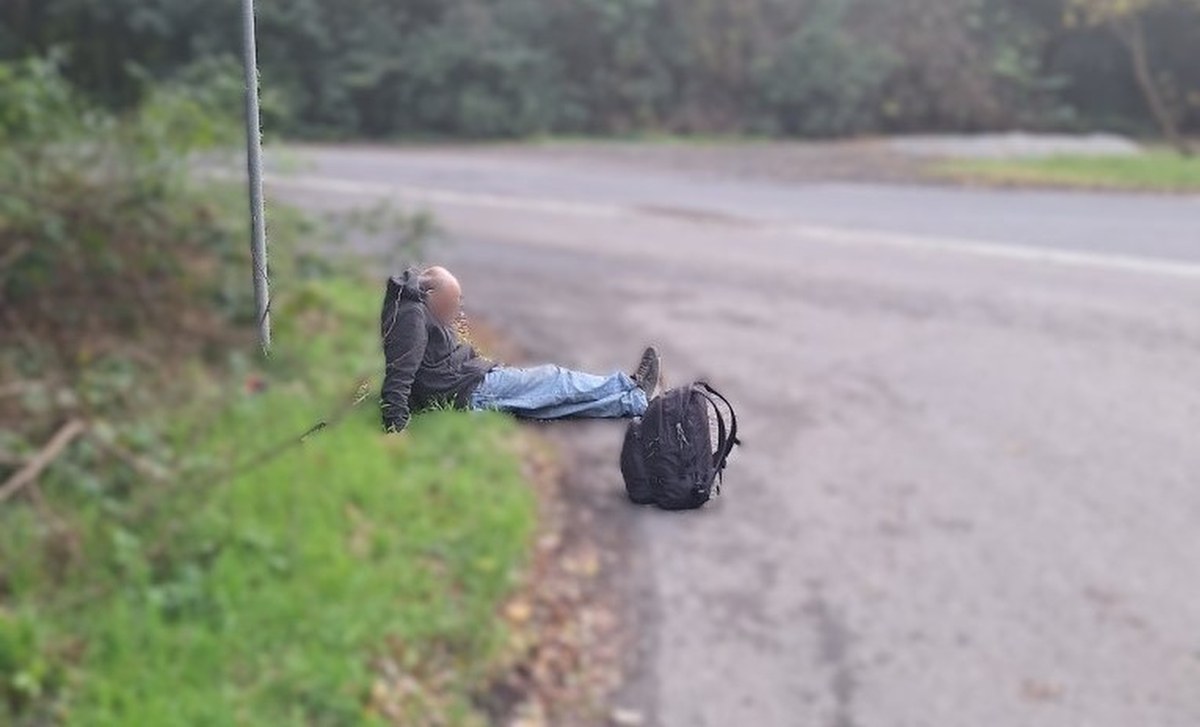When I was very young, I was manipulated into sex reassignment (also known as sex/gender correction or sex/gender transition) by a transsexual man in his mid-40s. For several years he gave me puberty blockers – dangerous substances that block the effects of testosterone – and hormones of the opposite sex, i.e. estrogens. Just before I turned 18, a psychologist, psychiatrist, and sexologist, after one visit, without any tests, fabricated a diagnosis of transsexualism and referred me, officially, for a sex change, which should never have happened. Currently, I have had a reversal procedure, returning to the true sex I was born with, which I am very happy about. This story is described below.
Author: Łukasz Sakowski, translators to English: Małgorzata Koraszewska, Sarah Lawson, Jo Jurczyszyn.
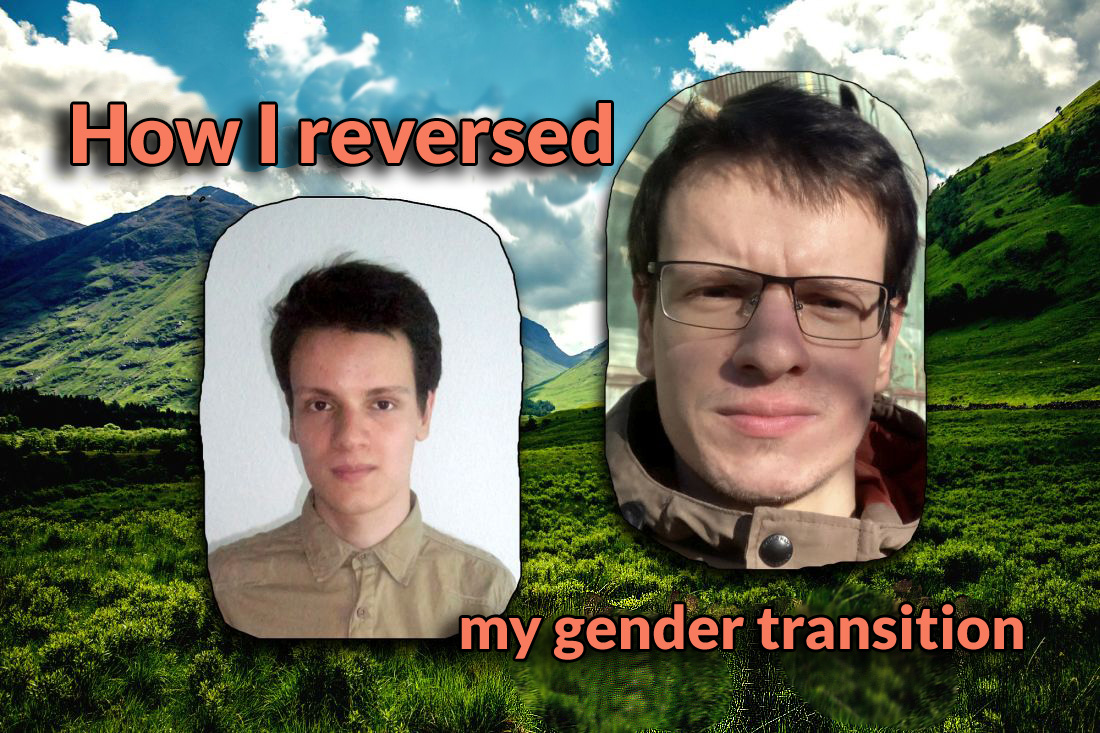 The photo on the left shows me about a year after reversing my sex change, in the photo on the right, eight years after.
The photo on the left shows me about a year after reversing my sex change, in the photo on the right, eight years after.Transsexualism – root causes
I’m gay and that has a lot to do with the story. When I was 12, I struggled with a lack of self-acceptance. I already knew that I liked people of the same sex. For the first time, I experienced my childhood „crush” on vacation, where my family and I went every summer. Fishing every day at 5 am, I met a boy a year older than me who was there in summer camp. I felt for him what I would call exactly what I wrote a moment ago: a childlike crush with no reference to sexuality or physical contact at all. I was 7, maybe 8 years old. It is at this age that many children first find themselves with this type of innocent fascination with a person of the opposite sex or, for gays and lesbians, of the same sex. I never met him again, but subsequent events in my life clearly indicated that I like people of the same sex. It was only later that I began to realize that this was unusual, even considered undesirable.
The awareness that I was attracted to people of the same sex matured in me very slowly and gradually. Over time, being in the older classes of primary school and then junior high school, I knew that I did not like the girls at all: neither emotionally nor physically. Same-sex couples were not accepted and were actively condemned. In fact, they were ridiculed, and calling someone „gay” was an offensive epithet. As I pondered my future, I increasingly thought that a normal, healthy, gay life would be impossible. I also developed a belief that same-sex attraction is wrong. Contrary to stereotypes, it did not result from religion lessons, because I met a similar, only milder, negative view of homosexuality first in high school; I can’t recall our quite strict nun in junior high school ever expressing a negative attitude towards gays.
It is difficult to hide homosexual orientation in adolescence and as many lesbians and gay men know, it is a great reason for peers who find out about it or suspect it, to ridicule, offend, insult or threaten, by, for example, saying that this will be broadcast to everybody. Being the object of mockery, harassment, and gossip, also from colleagues with whom you had good relations until recently, also causes one to be perplexed and confused about feelings and identity, and to constantly compare oneself and one’s development with others. One former close friend pretends not to know you, another spits in your direction, and so on. This also greatly contributed to the belief that homosexuality was wrong and deepened my disorder of body perception.
It is not without significance that my negative attitude towards gay people, important for further events, was also influenced by the image of homosexual people in the media. They often showed pictures from pride parades, in which gays, fetishists, and exhibitionists were seen strangely dressed and acting in a disturbing way. And I, like so many other homosexual men, absolutely did not identify with such patterns and behaviors. I don’t identify with them to this day. Such media coverage reinforced my belief that homosexuality was something strange and repulsive, and in any case related to disorders – since individuals who appear to be mentally and sexually disturbed are shown as gay and seem to be almost the only ones who openly talk about it. I was not aware that the media message does not reflect reality, that there are many ordinary gays outside the clubbing, exhibitionist, parading subculture. I do not condemn the latter, but I do criticize it for going too far in the wrong direction.
Unfortunately, the stereotype of coarse, flashy, immature, and hysterical, theatrical or exhibitionist gays manifesting their sexuality is still promoted by the gay subculture and some mainstream media, thus harming the next generations of young homosexual boys. As a child and teenager, I was under the delusion that this kind of provocative-aggressive style was standard for gay people, which became another cause of my denial of my orientation. I gave up hope of finding a regular gay boyfriend because I started to think that „normal” gays were almost non-existent. Today, after many years of observing the LGBT activist community, I know that the reason for the dominance of such controversial people or motifs at parades is that in many LGBT organizations the greater influence on their form and activity had and still has not homosexual people but “queers”, fetishists, and other special activists who link up to the theme of homosexuality, which gathers more and more social sympathy.
Gender reassignment idea
At the age of 13, struggling with a huge dilemma regarding my orientation, the impossibility of „dating someone” normal for this age, and increasing sex dysphoria, I came across the program „Rozmowy w toku”, run by Ewa Drzyzga, in which transsexuals were presented. It was then that the thought first occurred to me that this was a topic I should be interested in. Searching for information on the Internet, I came across a forum for trans people. Quite quickly I got in touch with one of its users – a 40-year-old m/f transsexual person (changing from a man to a woman). For the purposes of this text, I will call her Ewa. The communication between us moved to the then popular Gadu-Gadu chat room and was quite intense. I turned to Ewa with my problems regarding identity, orientation, emotions, school, and others. She was often unemployed and was from a small town in the Opolskie Voivodeship, and had plenty of time to correspond with me. Already in the first stage of our online acquaintance, she persuaded me to use feminine forms instead of masculine ones. It was persuasion, a suggestion that I should „not be afraid” to write „like a girl”. Over time, there were attempts to convince me that I should wear girlish clothes, apply makeup and paint my nails.
The blog „To Tylko Teoria” exists and can grow thanks to the independent financial support of my Patrons and Patronites. To join their ranks I invite you to my profile on Patronite.
Ewa, like many other trans people – which I found out bluntly when I met many people from this environment – couldn’t stand gay people. She had a keen hatred of homosexuality, which she told me on numerous occasions. She criticized them, ridiculed, devalued, and demonized them. This aversion also confirmed to me that gay people are bad people. Transsexual Ewa was someone important to me and, although I met her only on the Internet, I could write to her about various matters about which I did not feel that I could trust anyone else. The lack of direct live contact (the whole thing took place via Gadu-Gadu) was very conducive to this teenage naivety.
When I was 14, the topic of puberty-blockers came up in our conversations. Ewa offered to send me a medicine called Androcur. It is obtainable only by prescription, cyproterone acetate, with antiandrogenic effect (it inhibits testosterone). This puberty blocker has many side effects, some of which are labeled „common”. These include (according to the leaflet): „toxic liver damage, including jaundice, hepatitis, liver failure”, „depressive moods”, „gynecomastia”, „fatigue”, „hot flashes”, „benign brain tumors (meningiomas)”, “benign and malignant liver tumors”, “thromboembolic disorders”, “osteoporosis”. After about half a year, when I wrote to Ewa that I had abdominal pain on the right side under the ribs, she said that she forgot to tell me that together with Androcur I was supposed to take daily a drug “protective” for the liver (with silymarin) which was sold over the counter.
A few years later, around the age of 18, I had a densitometry, which is a measurement of bone density. It showed advanced osteoporosis (Z-score: -2.8). The doctor describing the result said that I had almost ¼ loss of bone mass relative to the normal one for my age.
 The result of my densitometry from 2011, when I was 18 years old. Z-score indicates advanced osteoporosis.
The result of my densitometry from 2011, when I was 18 years old. Z-score indicates advanced osteoporosis.A densitometric examination repeated after 10 years (in 2022 – several years after I had reversed the sex change and discontinued all hormonal drugs) showed osteopenia, despite the correct diet, vitamin D supplementation and a very active lifestyle, which I began when I got over the trauma of sex reassignment (so-called gender correction).
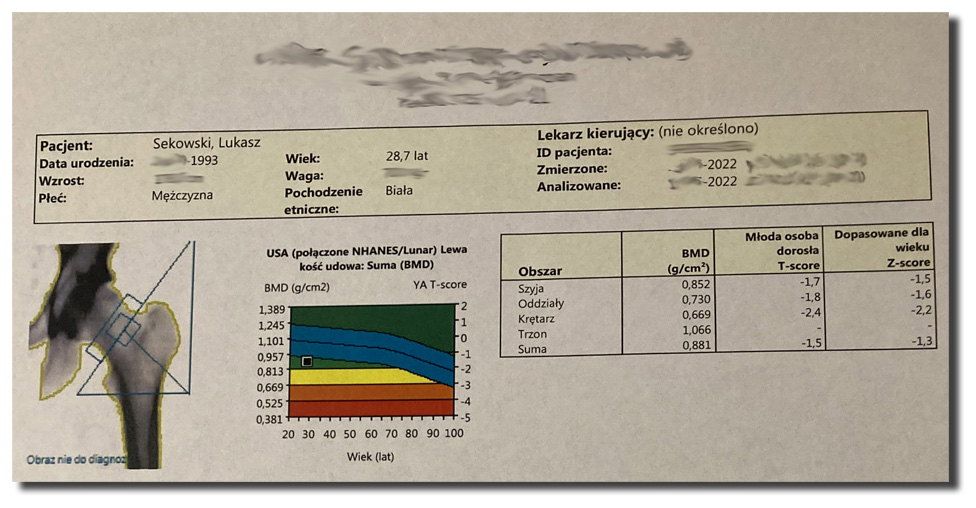 My densitometry from 2022, which is when I was 28 years old. Z-score indicates osteopenia, in some places close to osteoporosis.
My densitometry from 2022, which is when I was 28 years old. Z-score indicates osteopenia, in some places close to osteoporosis.Less than a year after I started taking puberty blockers – when I was about 15 – Ewa also started sending me a prescription-only estrogen medication, and in this case, all kept secret from my family. You could say that I had already started full hormonal sex reassignment therapy at that time: not only did I block my testosterone, but I also took an estradiol derivative in pills. I felt more and more discomfort and frustration when someone referred to me as male or when I had to wear some typically masculine clothing. I also felt a great aversion to my body and its masculine features, I felt repulsion and shame. Ewa, the forum and portals for trans people, as well as the message of transsexual activists, confirmed me in this alienation and pushed me to the next steps of changing my sex, like members of a sect pushing a novice to more and more drastic steps.
If someone asked me then whether I was happy that I was „changing my sex”, I would not only confirm, but even reply emphatically. Therefore, if I had been polled at the time as to whether I was happy with my „sex change,” I would have enthusiastically said yes. At that time, I succumbed to the phenomenon of cognitive dissonance, so despite the terrible feeling about my body and the situation, I had the impression that I was going in the right direction, and the sex transition helped me. The more difficult it was for me to be a (trans)”woman”, the more I denied it and justified for myself the rightness of continuing this madness. As well as the false information published by transgender activists on the Internet, along with giving them the appearance of reliable knowledge by ideology-driven sexologists, psychologists, and psychiatrists, Ewa rooted in me the idea that what was happening must be right.
So, an adult transsexual male, reassigning his body to a female by sex reassignment, got me, 14, to speak and write in the female form [ie using feminine grammatical forms in Polish to refer to oneself], completely messing with my developing psyche. He also encouraged me to paint my face and dress more girly. My clothes were not particularly feminine, because they were mostly loose, but nevertheless women’s sweatshirts or trousers. Anyway, for this reason, Ewa regularly reprimanded me to „dress up” in a more feminine way. Many times she directly said that I should start wearing high heels, skirts, dresses, etc., which I did not do and for which I often felt that I had to explain myself to her. After a relatively short period of using make-up, I practically gave up most of the typically feminine beauty products. However, I did not associate that with the fact that the idea of sex change was bad for me. I found the idea rather original and comfortable. At that time, much good was written and said about „virile”, „resourceful” and „strong” women. I also played games like Tomb Raider regularly and the archetype of this kind of woman impressed me. It sounds childish, but I was a teenager. However, I was urged not only to change my pronouns and feminine style of dress, but above all to identify myself as a „transsexual woman” and to take strong drugs that change metabolism and hormonal balance, negatively affecting the development of my body.
Transgender diagnosis
Parallel to the events I have described, I started going for diagnostic visits to a sexology and psychology clinic in Poznań. It was led by a well-known professor who was later widely reported in the media, as he was sentenced to a strict prison sentence for molesting patients. The trial took place after my contact with him, and I had almost all consultations with his employee and PhD student, now a PhD. She was the one who conducted the clinical interview and diagnostic tests with me. In addition, I was also genetically tested at that time to see if I had sexual development disorders (also known as hermaphroditism or intersex). It showed that I have a normal male karyotype: 46XY.
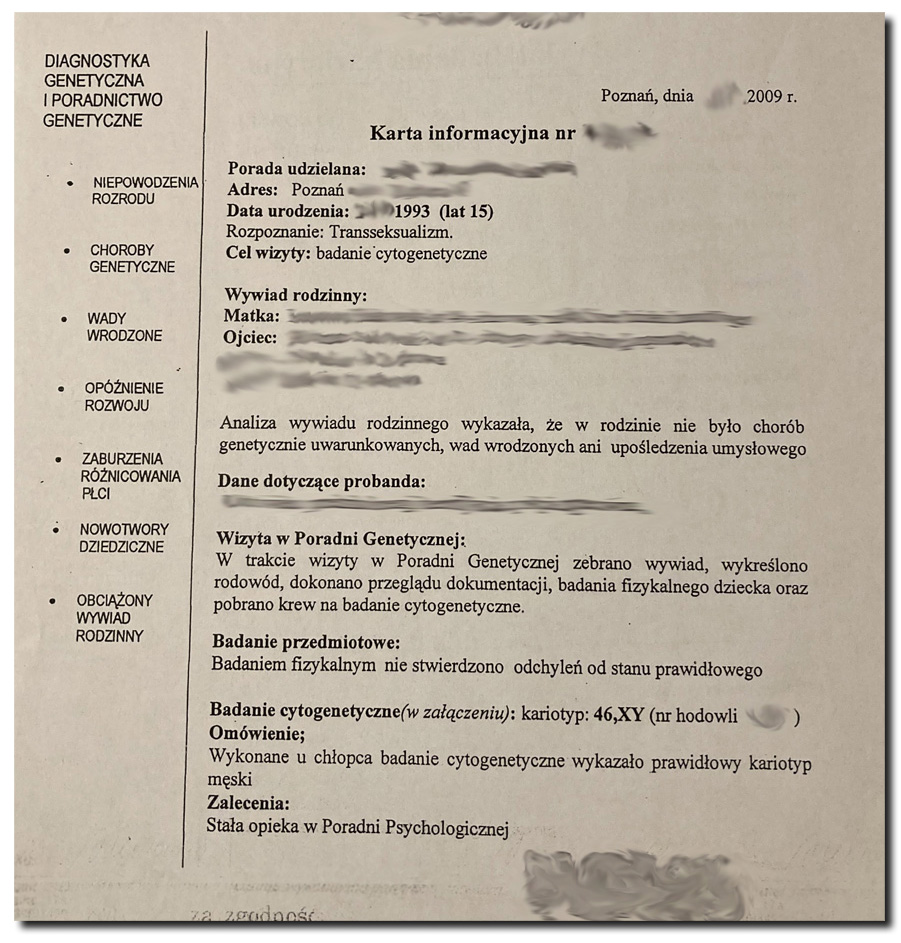 The result of my karyotype, showing the correct number of chromosomes and male sex chromosomes. The details of who was the patient are blurred because I was underage at the time, so my mother’s information is shown there.
The result of my karyotype, showing the correct number of chromosomes and male sex chromosomes. The details of who was the patient are blurred because I was underage at the time, so my mother’s information is shown there.I do not remember exactly how long this psychological-sexological evaluation lasted. I remember only that it was a process lasting several months, not a single consultation. At the very end I had to go to a case conference of specialists at the Adam Mickiewicz University in Poznań. Finally, the psychologist conducting the diagnosis, together with the professor, gave an opinion about me in December 2008.
Formulas that I read on a forum for transsexuals, saying that „I have felt like a girl since childhood”, did not help, as well as other tips suggested by Ewa, in which I sincerely believed at the time. In short, the opinion said that I had sex dysphoria (then called „sex disapproval syndrome”) and I was a teenager who did not accept my homosexual orientation, striving to change my sex to be perceived as a heterosexual woman – after all, a gay man after a sex change will still be gay, but from a social point of view, she will also be a heterosexual woman. „Łukasz Sakowski’s homosexual tendencies which he is poorly aware of, accompanied by (…) high psychological discomfort resulting from the lack of self-acceptance in the role of ‘gay’, caused him to adopt the idea of ‘being a transsexual person’ as a more acceptable option for his self-esteem” – it says, inter alia.
 Excerpt from the final opinion from my first diagnosis when I was 15 in 2008. The blurred section is about personal information. Sex/gender disapproval syndrome is synonymous with sex/gender dysphoria.
Excerpt from the final opinion from my first diagnosis when I was 15 in 2008. The blurred section is about personal information. Sex/gender disapproval syndrome is synonymous with sex/gender dysphoria.The diagnosis was correct, and the whole process carried out by this psychologist was thorough and insightful, but I completely denied it. In which, of course, I was strongly „supported” by Ewa and online „educational materials” from websites, forums, and foundations addressed to „trans” people. They were convinced that transition was the best choice, which was confirmed by „specialists”. Later, I tried to ask for at least puberty blockers in this clinic to have them officially, and not from Ewa, but the sexologist in charge did not agree to it. Time and the course of events have shown that this decision was the right one.
My situation – and I was 15 at the time of this diagnosis – was that I was still taking puberty blockers and hormones from Ewa (now she was sending me prescriptions in her name, not purchased drug packages), which I hid from everyone. I lived with the belief that a sex change was the right thing for me. Apart from brief periods of looking more feminine, I generally did not attach much importance to it. I spent a lot of time at home anyway and there was little opportunity for any female expression. When I didn’t have to go to school, there were times when I literally didn’t leave my apartment for two or three weeks. I broke off my childhood friendships out of shame and fear, and they often fell apart because almost no one wanted to hang out with the „freak” I was. I didn’t have any new friends.
I was very alienated, with only online acquaintances, especially with Ewa. In fact, I forgot what it was like to go out for a walk or meet my friends. I missed it very much, because I grew up in a block of flats, where the norm was that after doing your homework, and during holidays from morning to evening, with a break for lunch, you would run around the yard with your friends. Then such normal, good things started to scare me. Just leaving the house could make me panic.
I know what it’s like not knowing who you are and being lost, desperate, empty because of it. I know what is it like to feel such a strong fear of leaving the house that subsequent attempts end with returning to a room that gives a sense of security. I know what it’s like to sit for days and hours on the Internet or play computer games without any close friends or further social contacts.
In addition to my surroundings, puberty blockers have had an impact on my alienation, as „depressive moods” are among the common side effects of their use [1]. When someone is under their influence and becomes depressed, it is much more difficult for them to understand their own emotions and motivations and thus stop the process of sex reassignment, no matter how harmful it may be. Therefore, although 60-90 percent of people grow out of sex dysphoria, which is confirmed by numerous scientific studies [2], [3], [4], [5], [6], [7], [8], [9], [10] among those who have already started taking medication, the percentage of people whose dysphoria has passed is decreasing. However, at least in some of them, not because sex reassignment works for them, but because they are mentally unable to understand what is happening to them and decide to reverse their sex reassignment, because puberty blockers deregulate the maturation process of the brain. I was just such a case.
 Excerpt from the leaflet of Androcur (puberty blocker), cyproterone acetate, showing common side effects.
Excerpt from the leaflet of Androcur (puberty blocker), cyproterone acetate, showing common side effects.What’s more, puberty blockers and hormonal drugs administered at such a young age, in addition to affecting the brain and psyche, causing depression, also cause menopausal-like symptoms. I remember waking up many times at night all sweaty, and the sheets were as wet as if they had just been taken out of the washing machine. In addition, there were irregular hot flashes or sudden states of emotional agitation. These unpleasant experiences may additionally encourage you to decide on further sex change, to have it all behind you. Sex reassignment is thus a self-perpetuating, masochistic merry-go-round that is very difficult to give up.
Sex transition in adolescence
Then came the time of high school, where I tried to function as a girl, also periodically trying to be „more feminine”, at Ewa’s persuasion. Perhaps she took some pleasure in seeing me as a hyperfeminine woman. Every now and then she would insist that I start wearing heels or dresses, which I did not give in to, but tried other ways. It looked rather comical because I neither liked nor knew how to put on make-up. I also remember how annoyed I was wasting time on such things. So again, after some time, I gave up, considering myself a „virile woman” – a pattern that I followed.
I didn’t „pretend” to be a woman, but I actually felt that I was doing what I should and told myself that I „was” a woman. It wasn’t a game or a trick or a „dress-up” – it didn’t have a sexual, fetishistic or theatrical undertone to me. I didn’t take it as “dressing up as a woman” or “playing a woman”. It was the result of inner confusion and telling myself that my problems with the lack of self-acceptance will end if I cultivate a female identity. Since I detransitioned, i.e. reversed my sex change, I never styled myself or felt like a woman again. I understood what sex I am and accepted my homosexuality.
Of course, it’s not possible to function as a woman when you’re a man. However, I was convinced that when I turned 18 and formally changed my sex, i.e. changed my identity documents to female, I would start a normal life and everything would change. This was the vision of the world transgender activists and organizations are promoting by this toxic ideology. I found problems with not fitting in the role of a „girl” in external factors, sometimes blaming „transphobia” and „bad” society. I kept denying that I might be gay.
If all this were happening today, in the year 2023, I might have identified as non-binary in my teens. At that time, there was no such thing as non-binary in Poland, not even on transgender forums; the fashion for the non-binary subculture came later. It would give me a certain sense of blurring, escape from definite statements and actions, and thus responsibility, and additionally it would not require the use of puberty blockers and hormones. But at the same time, due to inaccuracy, subjectivity, and lack of specificity, it would cause a suspension, a normalization of the pathological state and, in the long run, it would prevent understanding the problem and its causes and getting out of it. Besides, at the time when I changed my sex, i.e. in 2007/2008-2014, and especially at the beginning of this period, sex reassignment process was not popular in the media. Today, however, young people receive recognition for stating that they are transsexual or non-binary, because they are considered a minority, victims, people who deserve privileges. Some activists, influencers, and journalists have made great careers practically only out of being „trans” or „parents of a trans person.” All this makes such an identity tempting, which was not the case in the environment where I „decided” about my sex change.
The specialists who fabricated the diagnosis
Coming back to my story: shortly before I turned 18, I went to a psychologist in Poznań. She was known in the transgender community. She was recommended on forums, she was officially recommended as a reliable expert by the Trans-Fuzja foundation. I had the impression that she was the kind person with a sense of mission. I explained to her that I had been receiving puberty- blockers and hormones for several years from a transgender person I met online, and that my parents did not know about it. It didn’t bother her, quite the contrary. She expressed her enthusiasm that I could „be myself” from such a young age. I also told her about the diagnosis three years ago, to which she literally waved her hand and replied with a smile that its author would soon be in prison for molestation anyway (the sexology professor’s trial was already underway, but the sentence had not yet been handed down). She added not to mention this diagnosis in court during the trial, but just forget about it. She also said that if the court asks questions, I should say that I have been seeing her for a long time, and not just twice – which was really the case – and that I should not say that I took hormones from Ewa. She just made me lie.
She suggested that for the next meeting she would prepare a psychological report confirming my transsexualism, and that I should come to it with my mother. I remember asking twice more if we could do psychological tests. She replied that there would be no time anyway, because she was closing her office permanently and was leaving for Canada any day now. She didn’t take any money from me. I don’t know if it was because I also mentioned financial problems to her, or because she was „on the way out” and could no longer issue bills. At the next meeting, she assured my mother, worried about the lack of diagnostic tests, that I was „transsexual”. She repeated the advice not to mention the opinion of the „harassment” professor in court and to say that I had consulted her many times. She gave me the contact details of her friend, a psychiatrist and sexologist, because I needed their diagnostic certificates for the court – to legally change my sex in documents – and she wished me all the best.
„I hereby certify that on the basis of diagnostic and therapeutic meetings, during which a clinical interview and a battery of psychological tests were conducted with Łukasz Sakowski (here are my more precise data and the female name I chose) I state that she is a transsexual person” – reads the opinion of the psychologist. It is completely fabricated. I did not have any diagnostic and therapeutic meetings with her. She didn’t run any tests with me either. The final sentence of her opinion – „The patient does not have any mental disorders” – sounds reassuring, but has not been supported by any analyses. Everything was made up by this psychologist and recorded in a document directing me to change my sex when I wasn’t yet 18.
 A fabricated diagnosis I received on my second visit in 2011, two months before I turned 18. Also, the statement that I was fully aware of the consequences of changing my sex is a lie, both in the sense that I was not, and in the sense that the psychologist did not examine me in any way.
A fabricated diagnosis I received on my second visit in 2011, two months before I turned 18. Also, the statement that I was fully aware of the consequences of changing my sex is a lie, both in the sense that I was not, and in the sense that the psychologist did not examine me in any way.Let me quote here a fragment of this in-depth opinion from 2008, issued when I was 15, and which I negated under the influence of Ewa, and which the psychologist fabricating the diagnosis waved her hand at: „Łukasz Sakowski does not display behavior characteristic of transsexual people, he lacks the base elements of transsexualism, and thus there is a lack of justification for further management provided for people with this disorder”.
In the next step, I went to the doctors to whom the psychologist who fabricated the diagnosis had sent me. It was necessary because the court needed a psychiatric and sexological diagnosis in addition to a psychological one. The visit to the psychiatrist lasted about 10 minutes. She asked me if I had delusions, mood swings, or suicidal thoughts, and then she wrote out a certificate diagnosing transsexualism. She didn’t do any research or actual clinical interview. Today this woman is dead – she died a few years ago. In turn, a sexologist (and gynecologist at the same time) – who also did not take any reliable clinical interview for transsexualism or disorders that could give symptoms of sex dysphoria, despite the fact that she issued me a certificate with the diagnosis of transsexualism and prescribed hormonal drugs on prescription – still accepts patients today. I remember that her attitude was extremely reckless: her main remark was that I “looked great” and she completely dismissed my concerns about my liver by saying „there are more important things to attend to.” For these doctors and psychologists, operating in the fashion of affirmations instead of real help, it was more important to make me a transsexual than to consider my mental and physical health, which at that time were in an increasingly worse condition.
I suspect that it worked in such a way that the sexologist and the psychiatrist, having a „tip-off” from this particular psychologist, issued diagnostic certificates without thinking. The circle of recommendations did its job, and that’s how this little system of „transitioning” of adults and minors – including me – functioned. Instead of getting me into psychotherapy, which I needed, I was pushed into a sex change that hurt me. I had a huge mess in my head, basic aspects of personality and identity were disorganized, I had symptoms of depression, loss of social contacts, and anxiety disorders. Transition was the last thing I could really want or need.
In retrospect, I see that the actions of these three – a psychologist, a sexologist and a psychiatrist – were not only unethical and illegal, but also incompatible with scientific knowledge. Some of the previously cited scientific articles [2], [4], [7], [8], [9], [10], proving that gender dysphoria in 60-90% of cases passes with age, were published before 2011 when I received this fabricated diagnosis. Therefore, all three „specialists” I saw had a professional duty to know this data and use it in their clinical practice. Yet none did. The only thing I can cite in defense of the psychologist fabricating the diagnosis is that when I told her about the not strictly legal puberty blockers and hormones I got from Ewa, she ordered me to do a bone density test (which I mentioned earlier).
Legal sex change through the court and the Registry Office took about a year and, contrary to what transgender activists preach, presenting this process as an endless struggle, it was not difficult at all. And in addition, it was over 10 years ago, when judges normally appointed court experts during the trial, including in my case. This prolonged the whole case, because it required the appointment with an expert psychologist and an additional hearing date. Currently, this is no longer always practiced.
Something is not right here
By the time I started college, I already looked, at least if you don’t pay attention to detail, like a young woman. I had no beard, my features were as delicate as possible, my hair was long, my figure was feminine. Somehow I had control over my voice and was able to get the higher pitch. Due to taking blockers and hormones from the age of 14/15, by the time I was 18 my breasts had grown, my waistline had narrowed, and my pelvis was wide. I treated going to university a bit like „starting something new”, having already female personal data and female PESEL [equivalent of NIN in U.K.]
However, very quickly it turned out that the old problems did not disappear. It’s a myth that sex transition „cures” depression, social relationship problems, autism, borderline personality disorder, non-acceptance of one’s sexual orientation, suicidal thoughts, or other problems. I have already encountered accusations of „transphobia” many times when I wrote that people with gender dysphoria, especially young ones, should go to psychotherapy, not be directed to sex reassignment. However, according to psychiatrists and psychologists in the increasingly profitable industry of sex reassignment, the problems of such people are caused by sex non-conformity/transsexualism and denying them a sex transition is „transphobia”. In my opinion, this is pushing people with serious problems onto a path that not only does not help, but even destroys health and life.
Although studies to date show that relatively few people give up on sex reassignment [11], [12], [13], [14], [15] – from one to about ten percent of respondents – there are a number of serious reasons why these data are dramatically understated. The main one concerns the methodological survivor bias. It depends on the fact that the study of the percentage of detransition – i.e. the percentage showing how many people reverse their sex change – includes people who have legally changed their sex and then returned to their true sex. Meanwhile, a lot of people give up sex transition before they change their identity documents. These people are usually not included in such studies.
To illustrate the scale of the survival bias, let’s imagine a hypothetical example where out of 100 people starting a sex transition, only 20 make a recorded (i.e. legal) change in documents, and the remaining 80 reverse the process before deciding to take legal action. Then of those 20 people, one reverses the sex change, while the other 19 stick to it. The official statistics will therefore state that only 5% of people (one in twenty) detransition, while in reality in this example it would be 81% (81 people out of 100).
Another serious methodological error, due to which the sex reassignment reversal rate is relatively low in today’s statistics, results from the fact that the surveyed periods of satisfaction with the transition usually range from a few to a dozen or so years, and the correctness of sex reassignment is something that can be decided after a lifetime. Many people will give up sex-change after 8, 10, or 20 years, when they finally find a good psychotherapist or appropriate life circumstances that encourage reflection and emotional, mental, and intellectual maturity. Those who add to the statistics of „satisfied with sex reassignment” may, after a few years, prove that sex reassignment is a crippling process, not a healing one. „Detransition may be more common than previously reported,” note the researchers [16].
Proponents of sex reassignment often refer to research studies looking at how many people reverted their sex transition five years after starting it, which usually indicate a few percent of those surveyed. Meanwhile, „there is some evidence that people reverse their sex reassignment an average of 4 or 8 years after a complete sex reassignment,” the researchers state[16]. I reversed my sex change after 8 years, so if I were included in such a 5-year research period, I would also add to the statistics of „satisfied”.
Sex change (sex reassignment): resignation
During my studies, when theoretically I should lead a happy life of a „trans-woman”, having a successful „passing”, my doubts intensified even more. When I planned an orchidectomy (removal of the testicles) for the first time around the age of 20, stress and tension were building up in me. The approaching date effectively motivated me to cancel the procedure. Ewa expressed disapproval of this. She also boasted that she, using some administrative tricks, managed to get the operation on the National Health Fund by fabricating a diagnosis of testicular disease. On the other hand, she did not have the full operation of sewing the penis inside to create an imitation of a vagina, like most transsexual „women”.
To myself, I explained the cancellation of the operation with „objective” reasons (financial, time issues, etc.) – I rationalized it. But deep down, I felt relieved. I postponed it for later; I can’t remember if it was half a year or more. Months passed and I also canceled the second appointment and this time I didn’t book another one. Ultimately, the surgery did not take place. And that’s very good, because if I underwent this operation, I would have to take hormonal drugs that are harmful to my health for the rest of my life after detransition, and I would also have sexual problems and become infertile. I saved myself thanks to my own sanity, a deep and increasingly conscious feeling that the whole idea of ”sex change” was an absurd and pathological idea, as well as biological knowledge (I was already studying biology at the time) and distancing myself from Ewa.
I was able to write this article thanks to funding from my Patrons on Patronite. Would you also like to support my activity? Join here.
I was also plagued by the sunk cost effect, i.e. the feeling that I had already lost so much time, health, nerves, social contacts and money on the sex reassignment process that it would be „pointless” to withdraw now, even if it was the best thing I could do. This cognitive bias is certainly another reason for lowering the detransition statistics. I can only imagine how much people who have undergone sex reassignment surgery suffer and deny that it was a mistake so as not to go mad with despair. It also explains why they so passionately attack people like me who have managed to reverse their sex change. Shame and self-loathing are enormous in such a situation. I remember very well how afraid I was to admit to myself, and then to others, that the sex change was a mistake. Some, instead of accepting that they made a bad decision (or were pushed or manipulated towards it, as I was) and trying to reverse its effects, will use every possible means to divert attention from this fact and remain in the pathological situation.
Knowledge matters
An important, though not primary, factor in the whole process was the acquisition of biological knowledge. Because I studied biology and took it really seriously, I learned a lot from it. I wrote my master’s theses in biochemistry, histology and genetics. Overall, I think I benefited a lot from these studies and learned a lot. Not only in the context of the acquired knowledge, but also the ability to consciously and intelligently navigate the natural sciences, read scientific research, verify information, and use other tools of this kind that I have been developing to this day. Thanks to this, I began to notice how much of the dogma present in the narratives of transgender activists are disinformation, manipulation, and lies, for the sake of concealment called „modern science”, with which in fact they have nothing in common. Mostly through constant repeating that science – and especially supposedly psychology and sexology – backs up their theses, they manage to convince unsuspecting people like me in the past. To this day, I remember how I presented these formulas to my parents: „After all, that’s what science says”, „these are facts resulting from the opinions of sexologists”.
Thanks to biological – or more broadly, natural science – knowledge, I saw how absurd and inconsistent with the facts are views such as: ” Biological sex does not exist”; „Sex is a spectrum”; “There are many sexes and one of them is transsexuality”; „You can choose your sex”; „Sex is determined by the brain and psyche, not biological sex”; „Gender dysphoria is irreversible”; „Transsexuality is inborn”. These and other disinformation theses, approaching denial of sex, are just activist wishes, and have not the slightest support in reliable, well-established science unrelated to activism.
Detransition – return to my true sex
In May or June 2014, on the occasion of endocrinology tests, I went for a free psychological consultation as part of a day in the hospital. Although it was just one visit which lasted about an hour and a half, it gave me a lot to think about. During this visit I did not admit that I was thinking about reversing the sex change. I felt ashamed and when the psychologist brought up the subject directly, I denied it. But she asked me the right questions, and it made me think further.
In the summer of 2014, I decided to stop taking hormonal drugs. A little later, I admitted to my family that the sex change was a mistake. I also severed all contact with Ewa. I was wondering how to go back to male personal data as there was no legal way to do this. I turned to the trans forum for help. However, I was met with hostility there; I was considered a traitor. Some people wrote that if I have to reverse the transition, I should do it abroad, not in Poland, because I would make Polish courts less willing to issue positive (for sex change) judgments. The fact that for more than a year – since I started talking about sex on the blog – I had been harassed and slandered by transactivists, and their environment was also not accidental. I found out some time ago that the community of Polish transgender activists knew about my return to my true sex. I was even blackmailed by one of the country’s most recognizable transgender people that my private history could be revealed. In fact, that’s largely what prompted me to make this coming-out.
First, I went to an expert forensic psychologist who gave me an opinion during my first lawsuit just after turning 18. To be clear: it was not the one who fabricated the diagnosis – this forensic expert is a completely different person, another psychologist, but elected on behalf of the Court. She advised me to file a lawsuit with the Court on the same basis as before, only in the direction of recognition that I was a man. (The court in its judgment in sex reassignment processes recognizes that someone is of a certain sex – opposite to the biological one – and on this basis you can then change the birth certificate and obtain a new ID card at the office.) The former expert also offered to support my claim in court.
In her original opinion for the Court – during the first trial – for which she conducted a clinical interview with me and my parents and several tests, the forensic expert wrote that „Persons of this age are still very intensively developing their personality and individual sense of sex identity”, and also that the shaping of „sex identity is not yet complete”. During the testimony in the first proceedings (during the reassignment to female) the expert also told me to be careful with irreversible surgical operations.
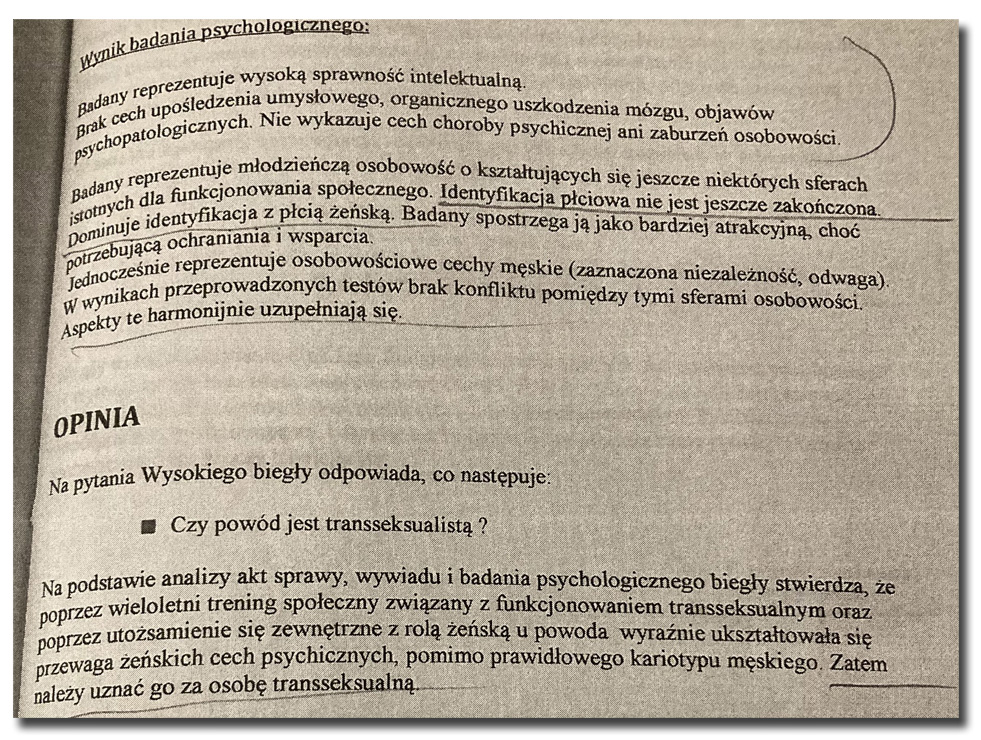 A fragment of a forensic expert’s diagnostic opinion during the first process of changing personal data (during sex change), from 2012.
A fragment of a forensic expert’s diagnostic opinion during the first process of changing personal data (during sex change), from 2012.In my first trial (during my transition) the judge asked me if anyone had influenced my decision to change my sex, which I denied. I didn’t do it consciously anyway. I mean, I didn’t feel that I was telling an untruth, and I didn’t understand how manipulated I was as a teenager. I also didn’t know how bad my emotional and mental state was, and that I was developmentally incapable of making such decisions freely and consciously. I was still convinced that everything was my own decision, and I didn’t want to admit to myself that I was being molded by an adult transsexual, perhaps a fetishist, to make radical changes to my body. In my „return” court trial (during detransition) the prosecutor’s office joined in, which was also on my side. I guess the prosecutor did it in order to awaken vigilance in the face of manipulation from third persons, like Ewa.
During the detransition trial, I admitted to the Court that I had received an opinion at the age of 15 from an infamous sexologist and his PhD student, which I had suppressed at the first trial. I took the blame on myself, without explaining about the psychologist who gave me a fabricated opinion and told me to lie. I wanted to complete the detransition process as soon as possible. I was extremely stressed that it might fail. At the same time, I knew that if I told about it, the psychologist with the fabricated diagnosis would be called all the way from Canada for questioning, which would take another month for an additional hearing date. At that time, the issue of guilt did not matter to me, my priority was different.
Since I did not have that first, accurate diagnostic opinion from 2008 – I destroyed it right after I received it at the age of 15 – I had to contact a psychologist from a sexology clinic who was doing these tests for me at the time and gave a diagnosis together with the aforementioned professor of sexology. She managed to find these documents in the archives, gave them to me, and I brought them back to the Court. The judge reappointed the court experts. I also want to quote two excerpts from their opinions here.
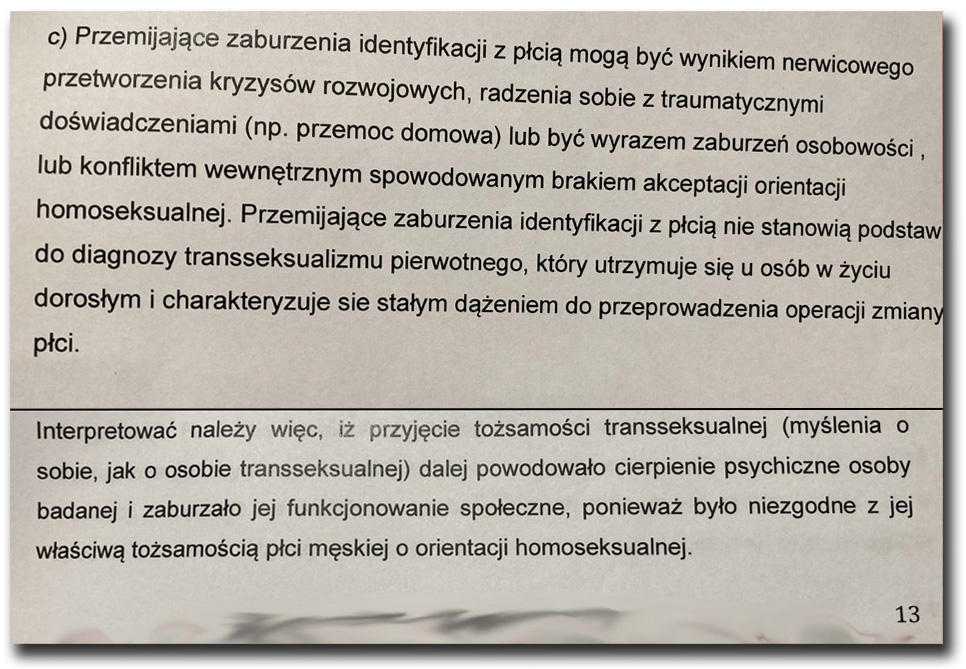 Fragments of forensic experts’ opinions during the detransition process (reversing sex change) in the Court, in 2015.
Fragments of forensic experts’ opinions during the detransition process (reversing sex change) in the Court, in 2015.As a result of the second lawsuit, I finally received the desired judgment and was able to change my personal data back to male. I received my third PESEL in my life: I had the first at birth, the second during the transition, and the third at detransition.
At that time, having legally reverted to my true gender, I was able to have breast removal surgery, which the doctors had previously refused to do. It was technically a gynecomastia procedure, but the surgeon told me that functionally it would be a full mastectomy. I started taking puberty blockers and hormonal drugs so early and took them for so long that the glandular tissue grew like in a biological woman. My chest is still a bit deformed to this day, and the scars from the surgery are painful. I also have a wider, female pelvis that I can’t do anything about – early blockers and hormones led to female bone structure. This example illustrates well how dangerous sex change is for health, because although I have not undergone any serious sex-change surgery, castration (orchidectomy), anyway, in order to at least partially undo the effects of taking puberty blockers and female hormones, I had to have a serious surgery under full anesthesia. It was a difficult operation for me, the effects of which I had to deal with for a long time, being forced to additional costly procedures even later, e.g. because of painful and unsightly scars.
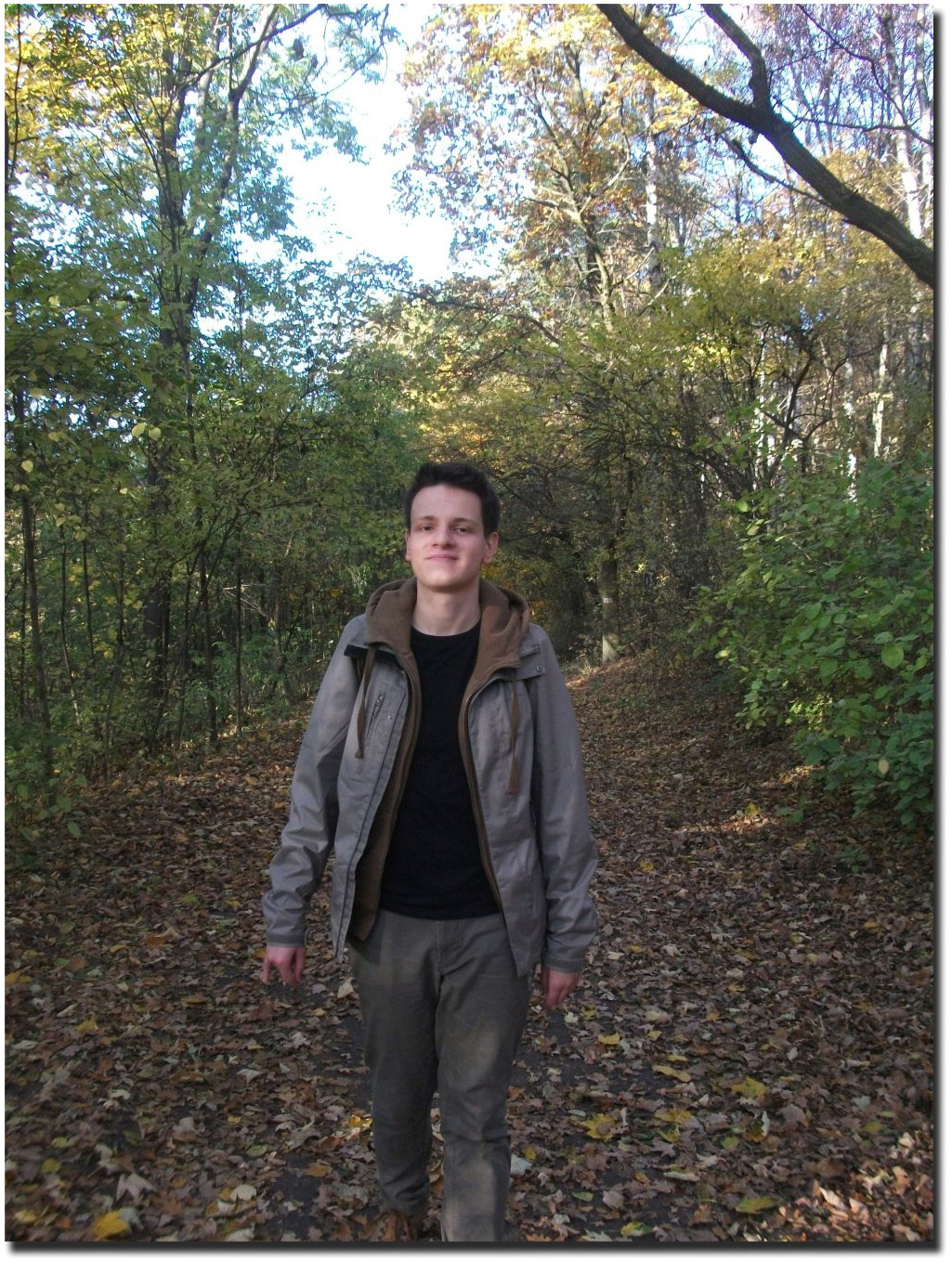 Me in 2015, shortly after detransition. Photo: Kamila Bejenka.
Me in 2015, shortly after detransition. Photo: Kamila Bejenka.Although my gonads have fortunately returned to testosterone production after some time after stopping the blockers and hormones, so I do not have to take it in the form of liver-damaging drugs, it took a long time before I stopped being mistaken for a woman again and again, despite cutting my hair short and wearing men’s clothes. Even today, it sometimes happens that someone will call me „ma’am” when talking on the phone, but situations such as the one that happened to me recently – a neighbor with a small child, riding with me in the elevator, corrected her several times when she called me „Miss” – they don’t make me angry or sad, but they are funny. I will probably have softer, feminized facial features forever.
The formal and medical detransition is behind me, but I have struggled with the consequences of what happened and still struggle to this day. I will always have an increased risk of various diseases, osteopenia or a deformed chest. I have bad memories of this trauma, the process of mutilation of the body and psyche, called sex transition or sex reassignment.
Gaps in medicine
My example shows what large gaps there are in studies showing a small percentage of people detransitioning, and indicating the alleged universal satisfaction with sex reassignment. The recently published study that I cited earlier, which was hailed in the media as irrefutable evidence that sex transition is a great solution for young people with gender dysphoria, covered a period of only five years. My wandering along this harmful path of sex reassignment lasted about 8 years. If such a study had been carried out in Poland at that time, I would have been one of the people contributing to the „statistics of satisfaction”.
People can repress various experiences, feelings and features of their own personality and identity for decades. Reliable research of this type would have to follow until death the lives of people claiming to be satisfied with the transition. And yet, unless there is a brain-testing technique to check what someone actually thinks and feels – phenomenologically – they would not be entirely reliable, because you can also die with a false belief in the rightness of your wrong actions.
I was able to write this article thanks to funding from my Patrons on Patronite. Would you also like to support my activity? Join here.
Messages from some organizations, such as the World Health Organization, positively assess the procedure of sex change. However, they rely on this type of erroneous research, without delving into their poor methodology, and in effect the results are inadequate in reflecting reality. Transgender activists claim there is a „positive scientific consensus” that sex reassignment is good for the health. It is only a narrative about facts which, as you can see, are very selectively, manipulatively, and incompletely provided by the supporters of the idea of ”irreversible gender dysphoria and transsexualism”.
If someone claims that minors, or even 18-year-olds, can consciously decide on such serious issues as taking puberty-blockers or hormones of the opposite sex, without physiological justification, because they believe that they are or were so special at this age, to be able to decide this, his or her sense of certainty and unusualness should arouse no less anxiety and worry than the opinion he or she expresses. Since the human brain, and primarily the prefrontal cortex, responsible for rational thinking, assessing the effects of one’s actions, or regulating emotions, matures at only around the age of 25, such a process that strongly interferes with the body, psyche, and socialization, such as sex change, should be allowed only after reaching this age.
Changes in the West
I regularly come across statements according to which people after detransition do not exist, and they are written about (that is, about us, because it’s also about me) in order to prey on transsexuals, and if they really exist, the reason for their return to their true sex is society’s intolerance, not that the sex reassignment process itself was a mistake. In fact, such a narrative is a type of manipulative social engineering that has been known for a long time and must collapse under the weight of evidence. This has already started to happen in Western countries: more countries or autonomous regions have stopped changing the sex of minors and restrict the change of sex for adults with special regulations.
The Karolinska Institute, awarding the medical Nobel Prizes, banned standard sex reassignment in minors in 2021, and in 2022, all of Sweden banned the routine referral of youth with gender dysphoria for a sex reassignment procedure [17]. Finland did the same, but two years earlier [18]. In 2022, the French Academy of Medicine explicitly warned against sex reassignment. At the end of the same year, the Spanish Society of Pediatrics and the Spanish Society of Child and Adolescent Psychiatry officially opposed sex reassignment in minors [19]. In 2022, the UK also closed a gender reassignment clinic for children, the „Tavistock”, because as a result of the investigation and evaluation report (The Cass [20]) it turned out that children were sent there en masse for sex change without psychiatric diagnosis and without psychotherapy, and their parents were blackmailed to the effect that if they did not support the transition of their child, it would be alleged that he/she would commit suicide. In 2023, a Norwegian public health institution called for restricting access to sex change, calling the sex reassignment process itself „experimental”.
More and more people in a situation like mine are talking out loud about what happened to them; more manipulations in scientific research come to light which allegedly proved that sex transition was beneficial and there were few people giving it up, or that puberty-blockers didn’t have serious side effects.
Currently, the world’s liberal, right-wing, and left-wing media such as The Guardian, BBC, The Times, Reuters, The Economist, The New York Times, The Atlantic, The Conversation, ABC, The Washington Post, Newsweek (American) – and many others – regularly write about the topics I have covered. In Poland, however, these facts are presented as „Russian propaganda” or „right-wing lies”, and the „rights of trans people” are presented as analogous to the rights of gays and lesbians, while ignoring the fundamental difference: the former is about mutilating oneself or others, the latter is about personal freedom in emotional and erotic relationships. It is also ignored that while sexual orientation is a strictly biological and psychological fact, transsexualism, as the French Academy of Medicine put it in its recent statement, is „primarily social” [21]. Making analogies between homosexual people and those who declare that they are transgender is to the detriment of a fair and honest public debate and of public opinion, which should learn about the problems I have described.
In fact, the dispute on this topic is different from the way it is currently stereotypically presented. It is not, as activists portray it, that we have poor and oppressed transgender people on the good side of history and transphobic bigots on the other side who got bored of bullying gays and switched to trans people. The fact is that a large part of the critics of transactivists (and their demands) are gays and lesbians (who in English-speaking countries have started to set up new organizations – LGB, without trans and non-binary people), and classic feminists. And more and more scientists, doctors and psychologists. The right wing primarily captures and publicizes this conflict, but it is not the main party to the dispute here. Presenting it on the basis that anyone who is against the demands of transsexuals supports the right-wing Polish parties PiS or the Confederation, is a demagogic falsification of reality. Personally, I am definitely closer to left-wing views and I would not like my story to be used for political games.
 Me in 2021, 7 years after detransition. Photo: Andrzej Korcz.
Me in 2021, 7 years after detransition. Photo: Andrzej Korcz.Why I decided to come out
The transition and its effects cost me a lot of physical and mental suffering, which are hard to describe in words, because they concern very difficult moments and periods in my life. I wrote this text because I care about the welfare of young people today who are confused about their identity, dislike their body, or question their sexual orientation and are being led by transgender activists and dishonest psychologists and psychiatrists towards medical body modification.
After what I have experienced, no tricks and manipulations of activists, influencers, and other such people, no pseudo-information campaigns presenting transsexualism and sex change in a positive light, impress me in the slightest. The slogans about „being yourself”, „gender matching”, „female soul in a male body” that are systematically proclaimed by transsexuals, do not impress me. What’s more, thanks to such passwords, as well as other specific behaviors, I know who I am really dealing with. However, many young people inevitably do not know this.
I also feel very sorry for parents who are blackmailed by activists saying that the lack of sex transition of their child will end in suicide. The popular message that „better a living daughter than a dead son” is cruel manipulation. Parents under its influence do not know what to do, and out of desperation, fear for their children, and lack of access to knowledge they are misinformed by activists that sex change is the only thing that can help, although in fact these harmful and partially irreversible hormonal therapies, surgeries, legal and social changes do not heal in the slightest. By my coming-out I would like to start a discussion in Poland on the unethical practices of doctors, psychologists, sexologists, activists, and various Internet celebrities dealing with sex transition, earning or making media careers from the physical and mental mutilation of young people.
This article was published and is available for free thanks to the support of my Patrons and Patronite. If you would like to join them, please visit my profile on Patronite.
Sources
[1] Androcur (Cyproteroni acetas). Ulotka dołączona do opakowania: informacja dla użytkownika. Bayer AG.
[2] Madeleine S. C. Wallien i wsp. „Psychosexual outcome of gender-dysphoric children”. Journal of the American Academy of Child & Adolescent Psychiatry (2008).
[3] Thomas D. Steensma i wsp. „Factors associated with desistence and persistence of childhood gender dysphoria: a quantitative follow-up study”. Journal of the American Academy of Child & Adolescent Psychiatry (2013).
[4] Alexander Korte i wsp. „Gender identity disorders in childhood and adolescence: currently debated concepts and treatment strategies”. Deutsches Ärzteblatt International (2008).
[5] Jiska Ristori i wsp. „Gender dysphoria in childhood”. International Review of Psychiatry (2016).
[6] Devita Singh i wsp. „A follow-up study of boys with gender identity disorder”. Frontiers in Psychiatry (2021).
[7] Kelley D. Drummond i wsp. „A follow-up study of girls with gender identity disorder”. Developmental psychology (2008).
[8] Charles W. Davenport. „A follow-up study of 10 feminine boys”. Archives of Sexual behavior (1986).
[9] Phil S. Lebovitz. „Feminine behavior in boys: Aspects of its outcome”. American Journal of Psychiatry (1972).
[10] John Money i wsp. „Homosexual outcome of discordant gender identity/role in childhood: Longitudinal follow-up”. Journal of Pediatric Psychology (1979).
[11] Cecilia Dhejne i wsp. „An analysis of all applications for sex reassignment surgery in Sweden, 1960–2010: Prevalence, incidence, and regrets”. Archives of sexual behavior (2014).
[12] R. Hall i wsp. „Access to care and frequency of detransition among a cohort discharged by a UK national adult gender identity clinic: retrospective case-note review”. BJPsych open (2021).
[13] Jack L. Turban i wsp. „Factors leading to “detransition” among transgender and gender diverse people in the United States: A mixed-methods analysis”. LGBT health (2021).
[14] Kristina R. Olson i wsp. „Gender identity 5 years after social transition”. Pediatrics (2022).
[15] Valeria P. Bustos i wsp. „Regret after gender-affirmation surgery: a systematic review and meta-analysis of prevalence”. Plastic and Reconstructive Surgery Global Open (2021).
[16] R. Hall i wsp. „Access to care and frequency of detransition among a cohort discharged by a UK national adult gender identity clinic: retrospective case-note review”. BJPsych Open (2021).
[17] Socialstyrelsen. „Uppdaterade rekommendationer för hormonbehandling vid könsdysfori hos unga” (2022).
[18] Palveluvalikoimaneuvoston suositus (PALKO). „Alaikäisten sukupuoli-identiteetin variaatioihin liittyvän dysforian lääketieteelliset hoitomenetelmät” (2020).
[19] Asociación Española de Psiquiatría. „La AEP y la Sociedad de Psiquiatría Infantil se adhieren al comunicado de la Asociación Española de Psiquiatría de la Infancia y Adolescencia sobre la Ley Trans” (2022).
[20] The Cass Review. „Independent review of gender identity services for children and young people: Interim report” (2022).
[21] „La médecine face à la transidentité de genre chez les enfants et les adolescents”. Académie Nationale de Médecine (2022).





